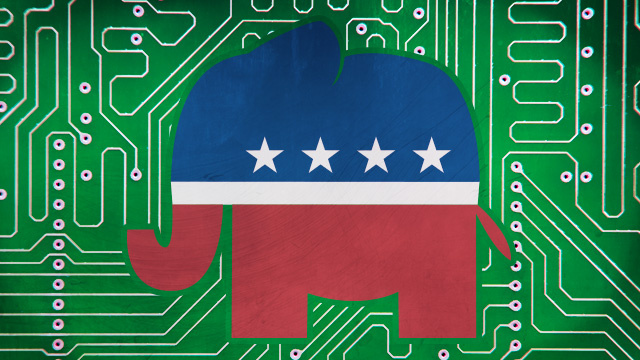
Republican lawmakers are working on two proposals that would hinder Federal Communications Commission efforts to help consumers.
The House of Representatives may vote as soon as this week on a measure that could disrupt net neutrality rules by stripping the FCC of rate regulation authority, The Hill reported. Separately, the House Subcommittee on Communications and Technology on Wednesday will hold a hearing on a bill that would limit the amount of money the FCC's Lifeline program could spend helping poor people purchase Internet service.
The rate regulation bill, approved by the Energy and Commerce Committee over objections from Democrats last month, would strip the FCC of authority to set broadband rates or review whether a rate is reasonable. Although the FCC has no plans to tell broadband providers exactly what they can charge, FCC Chairman Tom Wheeler argued last month that the bill's broad language could prevent the FCC from enforcing net neutrality rules against blocking, throttling, and paid prioritization. The bill could also prevent the FCC from taking action against zero-rating schemes in which ISPs favor content by exempting it from data caps, and it would "cast doubt on the ability of the Commission to ensure that broadband providers receiving universal service subsidies do not overcharge their consumers," he argued.
Lawmakers made some changes to the bill in response to criticism, adding exceptions for universal service protections, paid prioritization, and truth-in-billing rules. New exceptions also would let the FCC continue overseeing data roaming and interconnection disputes.
But the bill still goes too far, argues Public Knowledge Senior VP Harold Feld, an attorney and expert on FCC regulation. Preserving truth-in-billing rules simply means "that as long as broadband providers tell you they are price gouging you, they can do it," Feld wrote.
"The bill does not use the regular definition of 'rate regulation,'" Feld continued. "As the Supreme Court explained last January, 'rate regulation' means an agency uses a traditional ratemaking proceeding to set a specific price. [This bill] expands this into new territory by defining 'rate regulation' as the FCC using 'rulemaking or enforcement authority to establish, declare or review the reasonableness of such rate[s].'"
As a result, the bill would prevent the FCC from taking action even when it "finds that a broadband provider is using market power to overcharge consumers by imposing unfair terms and price gouging fees," Feld wrote. He argued that the bill could be fixed simply by using a common sense definition of rate regulation—but Republicans have so far resisted efforts to do that.
"Rate regulation, or the threat of potential rate regulation, creates significant uncertainty for ISPs and as a result, discourages investment and unique pricing structures or service plans," Republicans argued in the bill fact sheet.
Cutting Lifeline Internet subsidies
The bill to limit broadband subsidies for poor people was proposed by Rep. Austin Scott (R-Ga.) and is titled the "Controlling the Unchecked and Reckless Ballooning of Lifeline Act of 2016."
The bill discussion comes after last month's FCC vote allowing Lifeline subsidies to be used for Internet access rather than phone service. The FCC rejected a yearly cap of $1.75 billion, instead implementing a budget of $2.25 billion a year indexed to inflation. Scott's bill would undo that budget decision by imposing a yearly cap of $1.5 billion and prohibiting the use of subsidies to buy mobile phones or similar devices.
Scott argued that the program "is wrought with fraud and abuse" and that his bill seeks to reduce "wasteful spending while also promoting accountability across the federal government." The FCC did vote to create an independent entity to verify subscriber eligibility in order to reduce fraud. But Commissioner Mignon Clyburn argued that with a budget cap, the FCC "could not fully achieve my vision of a 21st century Lifeline program."
Public Knowledge says that Lifeline has room to grow given that it's only covering about one-third of eligible households. Even a cap of $1.75 billion "would effectively tell 25 million+ of the poorest families in the country that universal service—the fundamental goal of federal telecommunications policy—isn’t applicable for them," the advocacy group said.
Lifeline is the program often derisively referred to as "Obama Phone"—even though it was created under President Reagan to subsidize landline phone service and expanded under President George W. Bush to include cell phones and mobile voice.
Scott used the phrase "Obama Phone" three times in his press release, saying it's time to "phas[e] out the mobile-voice-only 'Obama Phone' program."
Despite the FCC's most recent vote, the commission did not change the amount of the subsidy available to each household, preserving it at the existing $9.25 a month. Because of the change, customers will be able to use the subsidy toward home Internet, mobile broadband, or bundles including both voice and Internet. The program is funded by ratepayers via surcharges on phone bills.
reader comments
285